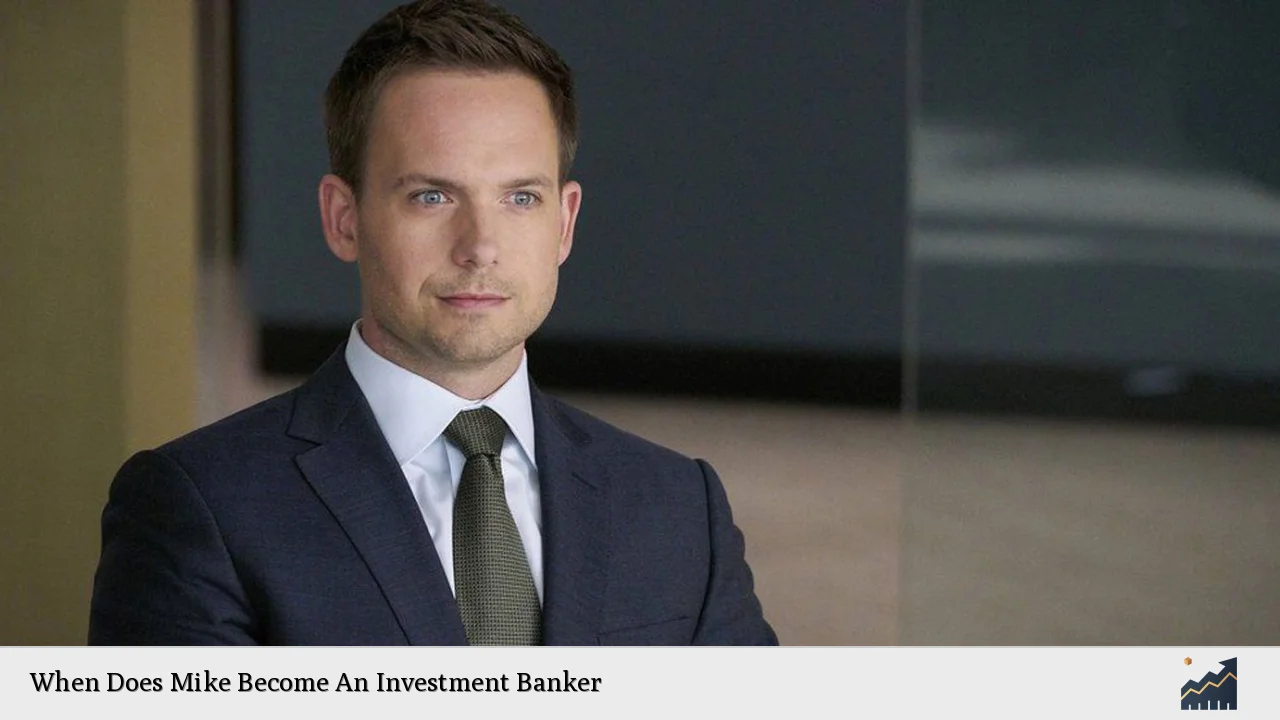Mike Ross, a central character in the hit TV series Suits, transitions from being a fraudulent lawyer to an investment banker in a pivotal career move. This shift occurs during the third season of the show, marking a significant change in Mike’s professional trajectory and personal development.
| Key Concept | Description/Impact |
|---|---|
| Career Transition | Mike leaves Pearson Specter to become an investment banker at Sidwell Investment Group |
| Timing | Occurs during Season 3 of Suits |
| Motivation | Attempt to escape the ongoing fraud of practicing law without a license |
| Duration | Short-lived stint before returning to law |
Market Analysis and Trends
Mike’s transition to investment banking reflects broader trends in the financial industry. Investment banking has been experiencing significant changes in recent years, with a focus on digital transformation and adapting to new economic paradigms. The sector has seen a shift towards private credit and an increased demand for sustainable finance solutions.
In 2024, the investment banking market is projected to reach $142.16 billion, growing at a compound annual growth rate (CAGR) of 8.3%. This growth is driven by factors such as industry consolidation, financial deregulation, and the development of derivatives markets. The sector is also witnessing a surge in advisory and underwriting revenues, with major US and European investment banks poised for a 30% increase in these areas.
Implementation Strategies
For individuals considering a career transition similar to Mike’s, several strategies can be employed:
- Education and Qualifications: While Mike’s genius allows him to adapt quickly, most aspiring investment bankers need strong educational backgrounds in finance, accounting, or business administration.
- Internships: Many investment bankers begin their careers with internships during their undergraduate studies. This provides valuable experience and networking opportunities.
- Entry-Level Positions: Starting as a financial analyst in wealth management firms, banks, or hedge funds can build the necessary experience for transitioning into investment banking.
- Networking: Building professional relationships within the industry is crucial for career advancement and opportunities.
- Continuous Learning: The finance industry is rapidly evolving, requiring professionals to stay updated with market trends, regulations, and new financial products.
Risk Considerations
Transitioning to investment banking, like any career change, comes with inherent risks:
- High-Pressure Environment: Investment banking is known for its demanding work hours and high-stress atmosphere.
- Market Volatility: The sector is susceptible to economic fluctuations, which can affect job security.
- Regulatory Scrutiny: Investment bankers must navigate complex regulatory environments, with potential legal risks for non-compliance.
- Skill Gap: Those transitioning from other fields may face a steep learning curve in mastering financial models and industry-specific knowledge.
Regulatory Aspects
Investment banking is heavily regulated to ensure market integrity and protect investors. Key regulatory bodies include:
- Securities and Exchange Commission (SEC)
- Financial Industry Regulatory Authority (FINRA)
- Federal Reserve
- Office of the Comptroller of the Currency (OCC)
Professionals in this field must adhere to strict compliance standards, including:
- Anti-Money Laundering (AML) regulations
- Know Your Customer (KYC) protocols
- Dodd-Frank Wall Street Reform and Consumer Protection Act
- Basel III capital requirements
Future Outlook
The investment banking sector is poised for continued growth and transformation. Key trends shaping the future include:
- Technological Integration: AI and machine learning are becoming integral to investment strategies and risk management.
- Sustainable Finance: ESG (Environmental, Social, and Governance) considerations are increasingly important in investment decisions.
- Digital Assets: Cryptocurrency and blockchain technology are creating new opportunities and challenges for investment banks.
- Flexible Work Models: The industry is adapting to hybrid work environments, balancing in-office collaboration with remote work flexibility.
By 2028, the investment banking market is expected to reach $194.05 billion, growing at a CAGR of 8.1%. This growth will be driven by sustainable finance initiatives, infrastructure investments, and continued private equity activity.
Frequently Asked Questions About When Does Mike Become An Investment Banker
- What motivates Mike to become an investment banker?
Mike transitions to investment banking as a way to escape the ongoing fraud of practicing law without a license, seeking a legitimate career path that leverages his intelligence and financial acumen. - How long does Mike’s career as an investment banker last?
Mike’s stint as an investment banker is relatively short-lived. He returns to the legal field after realizing his passion for law and missing the dynamic of working with Harvey Specter. - What skills from his legal background help Mike in investment banking?
Mike’s analytical skills, quick thinking, and ability to process large amounts of information quickly serve him well in the fast-paced world of investment banking. - Does Mike’s transition to investment banking reflect real-world career paths?
While dramatized for television, Mike’s transition does reflect the possibility of career changes between law and finance, as both fields require similar analytical and problem-solving skills. - What challenges does Mike face as a new investment banker?
Mike faces challenges adapting to the cutthroat culture of investment banking, learning new financial models, and navigating complex client relationships without his previous legal expertise to fall back on. - How does Mike’s experience as an investment banker impact his character development?
The experience broadens Mike’s professional perspective, enhances his financial acumen, and ultimately reinforces his passion for law, contributing to his character’s growth and decision-making in later seasons.

